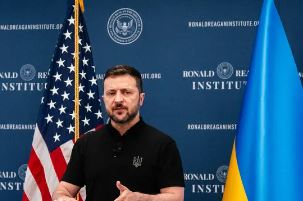Zelenskiy’s Diplomatic Mission: Cementing Bonds Amidst Political Uncertainty
President Volodymyr Zelenskiy of Ukraine embarked on a pivotal diplomatic journey to Washington, D.C., marking a crucial juncture in bilateral relations with the United States. His visit, timed during the NATO summit, aimed to bolster support for Ukraine amidst ongoing aid deliberations and amidst a backdrop of domestic political transitions in America.
Strategic Diplomatic Engagements
Arriving against the backdrop of NATO’s 75th anniversary summit, President Zelenskiy’s agenda in Washington was twofold: to solidify relationships with key U.S. lawmakers pivotal in future aid decisions and to express gratitude for the $175 billion in aid approved since Russia’s invasion in February 2022. His engagements included meetings with Senate and House leaders, focusing on committees integral to defense, spending, diplomacy, and national security.
Senate Intelligence Committee Chairman Mark Warner emphasized the significance of standing by Ukraine, underscoring bipartisan commitment despite fluctuating political landscapes in the U.S. This commitment reflects ongoing efforts to secure sustained support amidst uncertainties surrounding the upcoming U.S. presidential elections.
Political Dynamics and Aid Uncertainty
The visit coincided with heightened political uncertainty in the U.S., particularly amid President Joe Biden’s uneven public performance and challenges in maintaining approval ratings. These factors have injected a degree of unpredictability into U.S. foreign policy, especially concerning ongoing aid commitments to Ukraine.
Recent debates within Congress, exacerbated by President Biden’s electoral challenges and contrasting views from former President Donald Trump’s camp, have spotlighted divergent perspectives on future aid allocations. While Biden remains a staunch advocate for Ukrainian aid, opposition voices within Congress, aligned closely with Trump’s skepticism, pose challenges to further financial support.
Evolving Congressional Stances
The House of Representatives, historically divided on aid issues, witnessed a pivotal moment when Republican Speaker Mike Johnson shifted course to support a $61 billion supplemental aid package for Ukraine. This move, coming months after initial requests from the Biden administration, underscored bipartisan efforts to sustain financial assistance amidst geopolitical tensions and electoral posturing.
However, challenges persist as conservative factions within Congress, aligned with Trump’s policy stances, continue to resist additional aid allocations, casting shadows over future bipartisan consensus on Ukraine-related policies. The House’s recent vote on the aid package revealed stark divisions, hinting at potential hurdles should Republican influence grow following upcoming elections.
Geopolitical Imperatives and Security Concerns
Beyond partisan debates, Zelenskiy’s visit underscored broader geopolitical imperatives, emphasizing the strategic threat posed by Russia under President Vladimir Putin’s leadership. Johnson, in a recent national security address, highlighted widespread public support for countering Putin’s expansionist ambitions, resonating with American voters who perceive Ukraine as a frontline defense against authoritarian aggression.
The strategic alliance between Ukraine and the U.S., therefore, extends beyond financial aid to encompass shared geopolitical interests in stabilizing Eastern Europe and containing Russian influence. This narrative forms a cornerstone of bilateral discussions, emphasizing the need for sustained diplomatic engagement and international solidarity amidst global security challenges.
Conclusion
President Zelenskiy’s visit to Washington serves as a testament to Ukraine’s enduring quest for international support amidst evolving political landscapes. As geopolitical tensions simmer and electoral dynamics evolve in the U.S., the strategic partnership between Ukraine and its Western allies remains pivotal in shaping regional security dynamics and safeguarding democratic values against authoritarian threats.
Soumya Smruti Sahoo is a seasoned journalist with extensive experience in both international and Indian news writing. With a sharp analytical mind and a dedication to uncovering the truth, Soumya has built a reputation for delivering in-depth, well-researched articles that provide readers with a clear understanding of complex global and domestic issues. Her work reflects a deep commitment to journalistic integrity, making her a trusted source for accurate and insightful news coverage.



